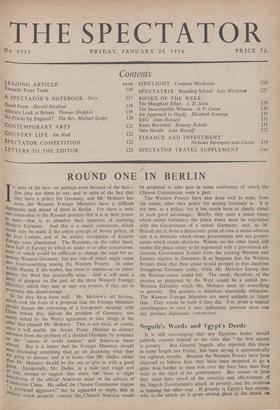ROUND ONE IN BERLIN
N spite of the fact—or perhaps even because of the fact— that they are three to one, and in spite of the fact that they have a policy for Germany, and Mr. Molotov has none, the Western Foreign Ministers have a difficult diplomatic task ahead of them in Berlin. For there is only one concession to the Russian position that it is in their power to make—that is, to abandon their intention of rearming Western Germany. And this is a major concession, which could only be made if the entire 5oncept of Soviet policy, of t.Db 0 Iron Curtain, and of the armed occupation of Eastern ',,tiroPc were abandoned. The Russians, on the other hand, l'ave half of Europe in which to make or to offer concessions, none of which would be sufficient to change the need for re- arming Western Germany, but any one of which might cause new heart-searching among the Western Powers. In other Words. Russia, if she wishes, has room to manoeuvre on minor Points; the West has practically none. And it will need a 14itY of purpose on the part of the three Westerh Foreign Ministers, which they may or may not possess, if they are to overcome this disadvantage. So far they have done well. Mr. Molotov's red herring, which took the form of a proposal that the Foreign Ministers _Mould discuss the convening of a five-power meeting with China before they discuss the problem of Germany, was neatly netted by the West's agreement to take things in the order that pleased Mr. Molotov. This is not ideal, of course, Since it will enable the Soviet Prime Minister to distract attention from the problem of a divided Germany by polemics on the ' causes of world tension ' and American bases abroad. But it is better that the Foreign Ministers should start discussing something than go on discussing what they the going to discuss, and it is better that Mr. Dulles rather „ an Mr. Molotov should be the one to give in with a good grace. Incidentally, Mr. Dulles, in a rude and rough sort o L ffi WaY. seemed to suggest that there has been a slight broadening of the official American mind on the subject of Communist China. He called the Chinese Communist regime „_kia. Convicted aggressor." but he appeared to imply that in Lit ters which properly concern thesChinese America would be prepared to take part in some conference of which the Chinese Communists were a part.
The Western Powers have also done well to state, from the outset, what their policy for uniting Germany is. It is not new, as a policy; but it has rarely been so clearly stated to such good advantage. Briefly, they want a peace treaty which unites Germany; the peace treaty must be negotiated with the Government of a united Germany; and, as M. Bidault put it, from a democratic point of-view it seems obvious that it is elections which create governments and not govern- ments which create elections. Russia, on the other hand, still wishes the peace treaty to be negotiated with a provisional all- German Government formed from the existing Western and Eastern regimes in Germany. It so happens that the Western Powers think that their cause would prosper in free elections throughout Germany today, while Mr. Molotov knowf that the Russian cause would fail. The result, therefore, of the process as proposed by the West would be a united pro- Western Germahy which Mr. Molotov must do everything to prevent. His position is therefore essentially defensive. The Western Foreign Ministers are most unlikely to forget that. They would be fools if they did. For, given a mutual unwillingness to start a war, diplomatic pressure must one day produce diplomatic concessions.


















































 Previous page
Previous page